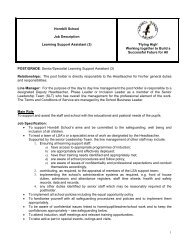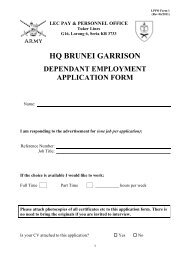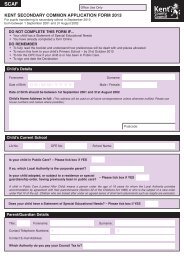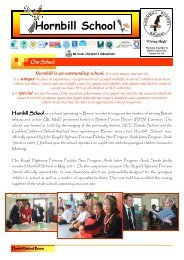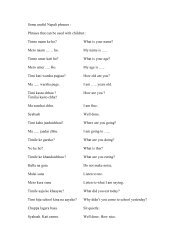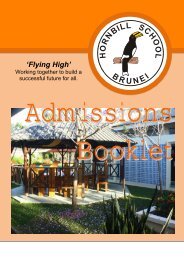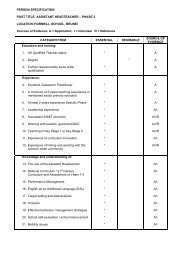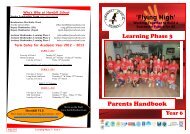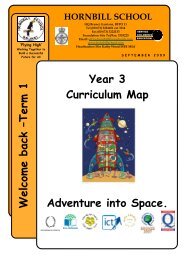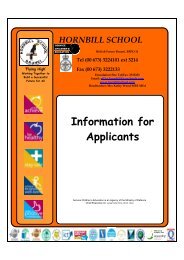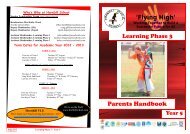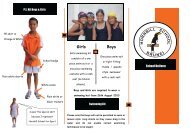2009-2010 - Hornbill School Website
2009-2010 - Hornbill School Website
2009-2010 - Hornbill School Website
Create successful ePaper yourself
Turn your PDF publications into a flip-book with our unique Google optimized e-Paper software.
28<br />
Levels of Intervention<br />
Concerns<br />
If you have concerns abut a child, but they do not meet the SA criteria on the<br />
moderation sheet. If you place a child on IA then you should inform parents of your<br />
concerns.<br />
<strong>School</strong> Action (SA)<br />
Children on this level require additional and different support within the class context,<br />
but they are not entitled to extra time.<br />
<strong>School</strong> Action Plus (SA+)<br />
If a child has not made sufficient progress (evidence is vital to support this) and<br />
meets the moderation criteria for SA+ then they are entitled to 5 hours support. This<br />
support can be 5 hours 1:1, if you wish to group children then you must divide the time<br />
given between each child in the group e.g. four children in a group for 1 hour equates to<br />
15 minutes of each child’s entitlement.<br />
At this stage outside agencies are always involved. This is often the school’s<br />
Educational Psychologist, but may be a range of other professionals. They may<br />
undertake more specialised assessment and/or observe the pupil. Parental permission<br />
is always sought for a formal referral to any external service.<br />
Statement<br />
Only a very small proportion of pupils require a Statement of SEN. These pupils are<br />
likely to have severe or complex needs that require more specialist advice and support.<br />
Their entitlement of support varies from case to case.<br />
For pupils with statements, an Annual Review Meeting has to be held in addition to the<br />
regular termly reviews. At this meeting, consideration is given to whether the<br />
statement should continue, and whether provision/strategies should be maintained or<br />
amended. It should set new long-term objectives for the following year. All relevant<br />
professionals, including those who contribute to the original statement are invited to<br />
attend or submit a written report to an Annual Review.<br />
Procedures for children having English as an Additional Language<br />
On Arrival<br />
• Initial assessment as the child arrives, takes the form of meeting with the<br />
parents and discussing how much English Language the child has.<br />
• Initial informal assessments are made whilst showing the child around the<br />
school, settling in, meeting teachers and children.<br />
• After the settling down period of two weeks for a new child, the NST may<br />
decide that the child needs additional support. The NST will then hold further<br />
discussion with the child’s class teacher and go through the set of filter<br />
questions to identify whether the assessment required will be SEN or EAL. If<br />
SEN then the child will be referred to the Inclusion Leader. If the filter<br />
questions indicate EAL assessment then the NST will carry out the EAL<br />
Baseline Assessment for the child.<br />
• The NST will then fill in the Individual Targeted Support Plan and arrange a<br />
meeting with the parents to inform of the support plan in place. The progress



